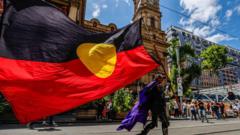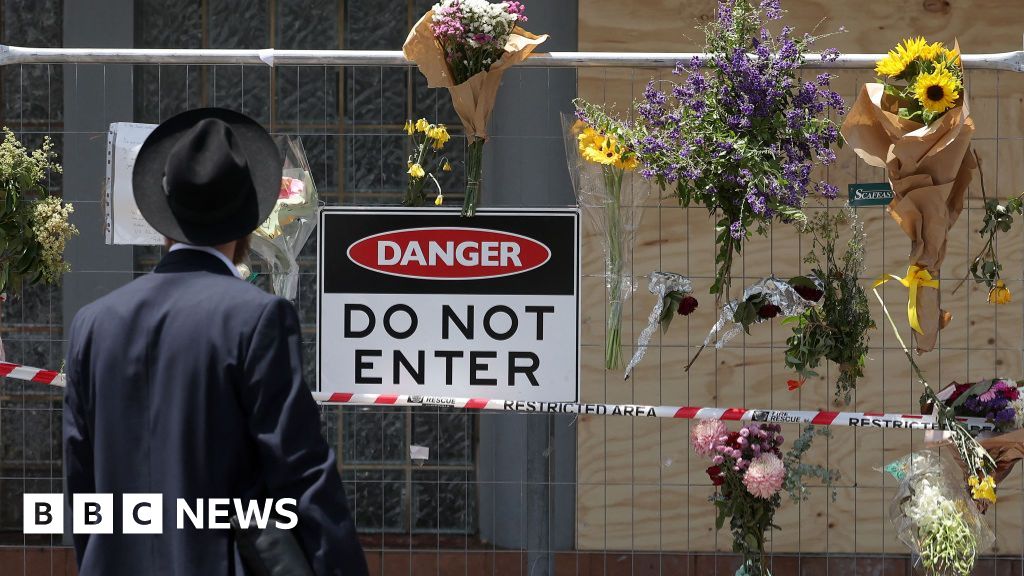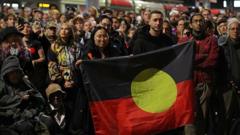In the lead-up to Australia's upcoming national elections, Indigenous communities find themselves at a crossroads, as issues pertinent to their rights and well-being continue to be overlooked. Unlike in previous election cycles, the small Indigenous town of Yarrabah, in Far North Queensland, is devoid of candidate posters and political engagement, a stark contrast to other regions of Australia where campaign fervor is palpable. Suzanne Andrews, chief executive of Gurriny Yealamucka Health Services in Yarrabah, expressed frustration that neither Prime Minister Anthony Albanese nor Opposition leader Peter Dutton addressed Aboriginal concerns during their most recent debates, stating, "What the hell's going on?"
Despite comprising roughly 3.8% of Australia's population of 26 million, Indigenous Australians are frequently cited as the most socio-economically disadvantaged group in the country. Historically labeled a "national shame," Indigenous issues have received less political attention in this election cycle, with a few notable exceptions. One instance arose when Dutton criticized Indigenous "welcome to country" ceremonies as being overdone, the only significant mention of First Nations topics during the campaign.
Experts assert that political avoidance of Indigenous matters stems from a fear of divisiveness, particularly following the significant backlash against the Voice to Parliament referendum in 2023. The proposed amendment aimed to recognize Aboriginal and Torres Strait Islander people in the constitution and enhance their political influence, but it was rejected by 60% of voters due to perceptions of creating special citizenship classes and disrupting governmental processes.
In the aftermath, many advocates, including those who opposed the Voice, lament that Indigenous issues have slipped from the political consciousness. Warren Mundine, a respected anti-Voice campaigner, remarked, "This is probably the first election that I've been in where there is no conversation about an Aboriginal policy. It's just gone silent." Lidia Thorpe, an independent senator, criticized Albanese for his avoidance of Indigenous topics and called for a legally binding treaty rather than further political maneuvering.
The continued struggles faced by Indigenous Australians are reflected in the "Closing the Gap" strategy, which has shown disheartening results, with only four of 18 socio-economic indicators on track. Political scientists, like Professor Rodney Smith from the University of Sydney, theorize that voter disinterest in Indigenous affairs has resulted in a lack of electorally viable policy proposals. Public attitudes have shifted, with decreasing belief among voters that the government should address inequalities between First Nations and non-Indigenous peoples.
Furthermore, the referendum's aftermath has not only perpetuated disengagement but, as reported, increased racial hostility towards Indigenous individuals. Reports indicate that incidents of racism and discrimination surged following the referendum, harming Indigenous populations, particularly the youth, who have faced hostility while pursuing education outside their communities.
Dilemma-laden sentiments echoed by Indigenous figures in Yarrabah emphasize the necessity for political leaders to address ongoing injustices and foster meaningful dialogue. Many community members, feeling ostracized from political discussions, have retreated from engaging in electoral politics altogether and expressed desires for a more respectful and informed conversation around their issues.
As election day approaches and Indigenous concerns remain sidelined, the silence echoes louder, underscoring the urgency for renewed political commitment to engage with and support Indigenous Australians.
Despite comprising roughly 3.8% of Australia's population of 26 million, Indigenous Australians are frequently cited as the most socio-economically disadvantaged group in the country. Historically labeled a "national shame," Indigenous issues have received less political attention in this election cycle, with a few notable exceptions. One instance arose when Dutton criticized Indigenous "welcome to country" ceremonies as being overdone, the only significant mention of First Nations topics during the campaign.
Experts assert that political avoidance of Indigenous matters stems from a fear of divisiveness, particularly following the significant backlash against the Voice to Parliament referendum in 2023. The proposed amendment aimed to recognize Aboriginal and Torres Strait Islander people in the constitution and enhance their political influence, but it was rejected by 60% of voters due to perceptions of creating special citizenship classes and disrupting governmental processes.
In the aftermath, many advocates, including those who opposed the Voice, lament that Indigenous issues have slipped from the political consciousness. Warren Mundine, a respected anti-Voice campaigner, remarked, "This is probably the first election that I've been in where there is no conversation about an Aboriginal policy. It's just gone silent." Lidia Thorpe, an independent senator, criticized Albanese for his avoidance of Indigenous topics and called for a legally binding treaty rather than further political maneuvering.
The continued struggles faced by Indigenous Australians are reflected in the "Closing the Gap" strategy, which has shown disheartening results, with only four of 18 socio-economic indicators on track. Political scientists, like Professor Rodney Smith from the University of Sydney, theorize that voter disinterest in Indigenous affairs has resulted in a lack of electorally viable policy proposals. Public attitudes have shifted, with decreasing belief among voters that the government should address inequalities between First Nations and non-Indigenous peoples.
Furthermore, the referendum's aftermath has not only perpetuated disengagement but, as reported, increased racial hostility towards Indigenous individuals. Reports indicate that incidents of racism and discrimination surged following the referendum, harming Indigenous populations, particularly the youth, who have faced hostility while pursuing education outside their communities.
Dilemma-laden sentiments echoed by Indigenous figures in Yarrabah emphasize the necessity for political leaders to address ongoing injustices and foster meaningful dialogue. Many community members, feeling ostracized from political discussions, have retreated from engaging in electoral politics altogether and expressed desires for a more respectful and informed conversation around their issues.
As election day approaches and Indigenous concerns remain sidelined, the silence echoes louder, underscoring the urgency for renewed political commitment to engage with and support Indigenous Australians.



















